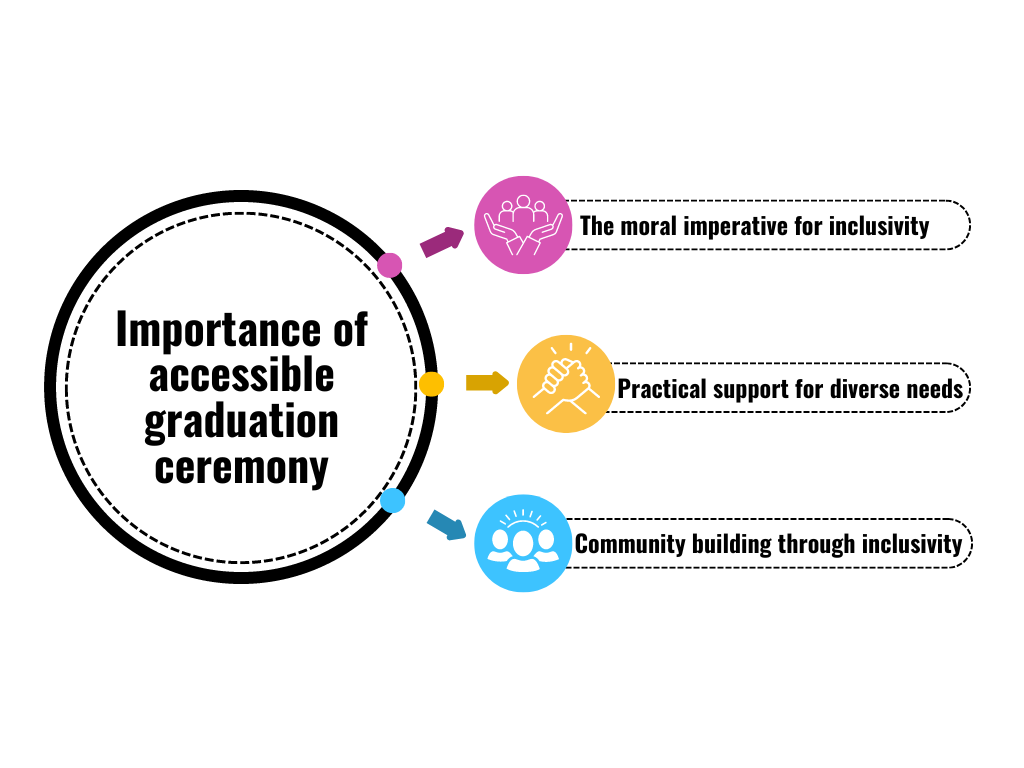7 Tips for Organising an Accessible Graduation Ceremony

Close your eyes and picture a graduation day. The air is filled with excitement as the graduates don their caps and gowns, ready to celebrate years of hard work. The family and friends have gathered, eager to cheer as their loved ones cross the stage.
Now imagine a graduate who has a hearing impairment or a graduate whose family speaks a different language. Or consider a scenario where many guests, including extended family members, friends, and colleagues, are attending the graduation ceremony.
What happen when your venue lacks ramps or elevators or you are not providing services such as sign language interpreters or real time captioning? Or what if your venue lacks significant parking space?
How would all these exclusions impact the special day?
These can end up causing disappointment or lead to negative publicity. Right?
That is why it is said that delivering accessible experience to students and their families is non-negotiable. Adding inclusivity in your graduation event, you can demonstrate respect and consideration for diverse needs while fostering a sense of celebration for everyone involved.
Tips to host a graduation ceremony that is accessible to all
The true spirit of a momentous graduation occasion can only be realised when it is accessible to all. Ensuring that every individual, regardless of their abilities, can participate fully in the celebration is not just a matter of compliance—it's a commitment to inclusivity, respect, and equality.
Here are essential tips to ensure your graduation ceremony is accessible to everyone.
1. Choose an accessible location

Choose a location for your graduation ceremony that fulfils all diverse accessibility needs. Make sure the venue comes with ramps that have gentle slopes and handrails for additional support. It has to be spacious enough to accommodate wheelchairs and other mobility devices.
Also, ensure that the venue has adequate lighting. Suppose the event extends into the evening; the pathways, entrances, and parking areas have to be well-lit so that you can be safe and navigate easily.
Don't skip the part to put easy-to-read signs throughout the venue to guide guests to key areas such as entrances, exists, restroom and other key areas. If possible, it will be a plus if you include braille and tactile signs for visually impaired guests.
Provide multiple seating options and do the seating arrangements in such way where each area offer clear views of the stage.
2. Keep an eye on the parking space
Accessible parking space is a must to ensure all guests can arrive and participate comfortably and safely. The spots should be clearly marked with international accessibility symbols. Make sure to use signage that should be highly visible and easy to understand.
You can go for the ideal idea by locating the parking space as close as possible to the entrance of the venue so that it takes less time for the guests to move, especially for guests with mobility challenges. In case there is a parking limitation, consider other alternative options, such as offering a valet parking service or arranging for shuttle buses.
3. Provide clear and accessible information
You have to make sure that all attendees have access to essential event details. Send detailed emails mentioning the event schedule, location, parking instructions or other accessibility features. For better readability, you can distribute printed programs and informational brochures.
It is wiser to create a dedicated, easily navigable website for the graduation ceremony where you can share all the up-to-date information related to the graduation ceremony.
If you are going for digital content, make sure it is compatible with screen readers by using semantic HTML and proper tagging. Design the content logically to make it easier for users to access the key points. In modern content creation, it also helps to consider accessibility from the start. If your attendees include non-native speakers, provide information in multiple languages.
4. Invest in the right technology

Install large screens around the venue where you can display important information such as speech text, names of graduates, and other visuals. Offer a live stream of the ceremony for those who want to add virtually.
Choose a streaming platform for that and make sure it is easy to access and compatible. Investing in graduation management software works great if you want to streamline the planning and execution of the ceremony, as these platforms handle tasks such as ticketing, registration, checking and other communication with attendees.
Scanners can be used to expedite the check-in process, as they can quickly verify tickets and other registration details.
5. Train your staff and ensure volunteer coordination
If you want to ensure that all attendees feel welcome and supported, you must have to equip your team with knowledge and skills to assist your guests with diverse needs. To effectively train your staff, consider implementing a comprehensive training program to educate them on various types of disabilities and other challenges that your attendees might face.
You can also provide them with hands-on experience by stimulating real-life scenarios. Suppose you can practice guiding a person using a wheelchair to their seat or helping a visually challenged guest navigate their venue.
6. Provide real-time service
You can set up help desks or information booths at any strategic location, such as near the main entrance, near the parking areas or close to seating areas. You can equip help desks with maps, event schedules and information about accessible services.
Offering a dedicated phone line or text service can also boost accessibility. Offer professional on-stage photography services that cater to all graduates so that everyone can have their moment captured professionally. Additionally, high-definition video recordings of the ceremony should be provided.
7. Don't overlook post-event considerations
Make sure your accessibility considerations extend to all post-event activities. Provide accessible transportation options so that the guests can leave the venue comfortably and safely.
Also, ensure that accessible parking areas remain unobstructed during post-event activities. Distribute surveys or feedback forms to attendees to ask about their accessibility experience. Try to send follow-up emails and messages to attendees.
An accessible graduation ceremony- why does it hold such importance?

Accessible graduation ceremony is not merely a logistic necessity but a moral imperative. Hosting an accessible graduation ceremony is important as it ensures that all students and guests can participate fully. This inclusivity not only respects the dignity of all graduates but also sets a positive example of equality and accessibility for the entire community.
It fosters community building as everyone can participate and celebrate together. For example, a graduate with a severe anxiety disorder benefits from designated quiet zones and support staff trained in mental health. This allows them to participate without overwhelming stress, ensuring they can celebrate their success with dignity and respect.
Overall, from positive institutional image to long-term benefits to community building, there are many key reasons why hosting an accessible graduation ceremony is so important.







